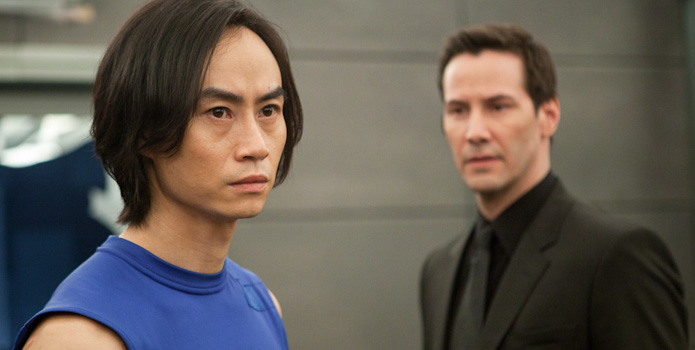
Everything about “Man of Tai
Chi” is awesome. Not awesome in the way you’re familiar, but awesome in the way
Stephanie Zacharek described in her delightful review of “Inception” a couple
of years back. “We’ve entered an era where movies can no longer be great,” she said, describing
Christopher Nolan’s silly funhouse mirror adventure film, “They can only be awesome, which is not nearly the same thing.” She was right, and who better than to ignore the
ramifications of that quote than the star of “The Matrix” himself, Keanu Reeves,
here making his directorial debut?
This exceptionally gorgeous
and exceptionally silly martial arts film follows workaday courier Chen Lin-Hu
(Tiger Hu Chen), a slinky, shaggy-haired blank who peddles packages by day,
training in the art of Tai Chi in his off-time. For those of you lazy bums who
do not know, tai chi is considered more of a performing art than a legit
fighting style, more decorative and symbolic than practical. As such, Chen’s
master forbids him from profiting off his skill, instead using his talents to
locate his inner chi. If you’ve seen one of these movies, however, you know
that he’s going to have to start beating up fools soon. No one ever makes a
martial arts film where the hero finds strength in not owning fools.

Into the picture walks Donaka
Mark (Reeves), who runs an underground fighting tournament where combatants
fight to the death. If they don’t provide a finishing move to their rival (one
of the film’s first lines is a voice bellowing, “FINISH HIM!”), a masked man
emerges from the shadows and snaps the man’s neck, the winning fighter disposed
backstage. Mercy has no place in this competition, which seems to be breeding
bruisers for the sole purpose of eventually turning them into corpses. Reeves,
to his credit, is a riot: his line readings are like that of a mad anime
villain, blocky and awkward. Reeves’ direction charmingly frames his dialogue
as if it were jumping off the screen. When a cell phone rings and a desperate,
penny-pinching Chen asks for a match, Donaka’s mouth barks, in close-up, “Then
a fight you will get!”
There’s something a bit
old-fashioned to the film’s twists, which are based in obvious genre tropes.
Chen is not the most compelling dramatic performer, but we still need to spend
time with him in the dark as he attempts to figure out why this shady “security
company” wants to see him fight. Soon, he’s shedding any pretense of honoring
his craft, using it in ruthless closed-circuit battles while Donaka Mark
watches on, with his pained, affected scowl. If nothing, this film’s reaction
shots will provide the Internet with enough gifs for years.

The fighting, choreographed by
Yuen Woo-Ping, is predictably fantastic. Reeves cuts around a few sequences,
unfortunately, but for the most part he captures the fights in a way that
emphasizes the physicality of the performers and respects the history of
martial arts cinema. There could be more diversity in the settings: a number of
fights occur in the same claustrophobic room, and the geography isn’t deceptive
enough to hide when a third figure appears in the room as if he walked through
a wall. The sameyness strikes again with a subplot involving a hardboiled cop
(Karen Mok) and her bureaucratic battles with an uninterested boss (Simon Yam)
going back and forth in the police department over whether this fighting
tournament is tied to a series of disappearances. Reeves finds enough coverage
to keep things from getting boring, but there’s an awful lot of
point-A-to-point-B storytelling sandwiched in between battles.
At least there are
the fights themselves. The film builds to seeing Reeves in action, and sadly he
moves very much like you’d expect for a late 40s American movie star. His
fighting isn’t bad, and his physical menace still considerable, but it pales
next to the widescreen brawls between trained professionals that make up the
bulk of the film’s runtime. Reeves’ film combines both an eastern understanding
for the martial arts and a westerner’s eye for composition and editing. This is
likely what Reeves’ intended, and the film’s goals are modest. It’s the
meandering drama that inflates the bloat of the narrative. Reeves accompanies
every obvious plot twist with dramatic crane shots and blaring horns on the
soundtrack, as if he were in charge of editing a trailer, not putting together
a full movie. It wants to be awesome, but instead it’s just “awesome.” [C]

